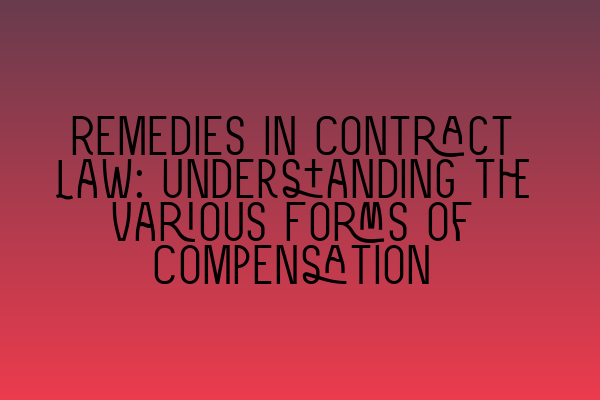Remedies in Contract Law: Understanding the Various Forms of Compensation
In the world of contract law, disputes can often arise when one party fails to fulfill its obligations under a contract. When such situations occur, it becomes essential to understand the various forms of compensation that may be available to the injured party. These remedies aim to restore the injured party to the position they would have been in if the contract had been properly performed. In this article, we will explore the different types of remedies available in contract law and provide a comprehensive understanding of each.
1. Damages:
One of the most common forms of compensation in contract law is damages. Damages are monetary awards provided to the injured party to compensate for the loss suffered as a result of the breached contract. There are two main types of damages: compensatory damages and punitive damages.
– Compensatory Damages:
Compensatory damages are designed to put the injured party in the same financial position they would have been in if the contract had been properly performed. The damages awarded may include both direct and indirect losses, such as loss of income, lost profit opportunities, and additional expenses incurred as a result of the breach. The goal is to provide a fair valuation of the damages suffered.
– Punitive Damages:
Unlike compensatory damages, punitive damages are not aimed at compensating the injured party for their actual losses. Instead, they serve to punish the breaching party for their misconduct, discourage similar behavior in the future, and act as a deterrent against wrongful actions. However, punitive damages are less commonly awarded in contract law cases compared to other areas of law.
2. Specific Performance:
While damages provide a monetary remedy, specific performance is a different form of relief available to the injured party. Specific performance is an equitable remedy that requires the breaching party to fulfill their obligations under the contract as originally agreed upon. This remedy is typically sought when the subject matter of the contract is unique or when monetary compensation may not adequately remedy the injured party’s loss.
3. Rescission and Restitution:
In certain cases, the injured party may seek to rescind the contract and seek restitution. Rescission refers to the cancellation or termination of the contract, and restitution involves restoring the parties to their pre-contractual position. This remedy is commonly sought when the injured party discovers that the contract was entered into under fraud, misrepresentation, duress, or undue influence.
4. Liquidated Damages:
In some contracts, the parties may include a provision known as a liquidated damages clause. This clause specifies the amount of damages that will be awarded in the event of a breach. Liquidated damages are pre-determined and agreed upon by the parties at the time of contract formation. However, it is important to note that liquidated damages clauses must be reasonable and not intended as a penalty, as courts are generally reluctant to enforce penalty clauses.
5. Injunctions:
Injunctions are another form of relief commonly sought in contract law cases. An injunction is a court order that restrains a party from taking a particular action or compels a party to perform a specific action. In contract law, injunctive relief may be sought to prevent a party from breaching the contract or to require a party to fulfill its obligations. Injunctions are typically granted when monetary damages are not sufficient or when irreparable harm would occur if the contract is not enforced.
Conclusion:
Understanding the various forms of compensation available in contract law is crucial when dealing with breach of contract issues. From damages and specific performance to rescission and restitution, each remedy serves a unique purpose in restoring the injured party to their rightful position. By consulting with a qualified solicitor, you can navigate the complexities of contract law and seek the appropriate remedy for your specific situation.
Related Articles:
– Mentorship for Aspiring Solicitors: Nurturing Talent in the Legal Field
– Legal Challenges and Pitfalls: Navigating the Complexities of the Legal System
– The GDL (Graduate Diploma in Law): A Pathway to Becoming a Solicitor
– Mastering the Solicitor’s Path: Prepare for the Journey Ahead
– The Benefits of Becoming a Solicitor: A Rewarding Career
